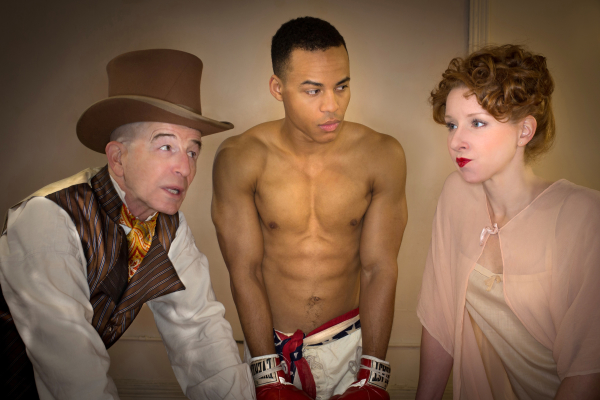Horseplay: or, The Fickle Mistress, a Protean Picaresque

(© James Eden)
Before there was Kim Kardashian, there was Adah Isaacs Menken. Indeed, after learning of Menken's many style makeovers, her propensity for revealing photographs, and the parade of famous men (and women) she romanced, the similarities between Menken and our latter-day superstars becomes quite apparent. There is no more delightful way to learn about Menken than Trav S.D.'s Horseplay: or, The Fickle Mistress, a Protean Picaresque, now being presented by Theatre Askew at La MaMa's Ellen Stewart Theatre. It's a rollicking and unbelievable story, overflowing with scrappy DIY theatricality that will make you feel like you're seeing a traveling show back when Menken was regularly front-page news.
Of course, few remember Menken today, but she was a constant source of gossip and scandal in Civil War-era America and Europe. In their 2011 biography, A Dangerous Woman, Barbara and Michael Foster call her "America's original superstar" and note, "In the mid-nineteenth century, she revolutionized show business with a modern flair for action, scandal, and unpopular causes, especially that of the Jewish people." But was Menken even Jewish? Or was her adoption of a Jewish identity something akin to Madonna with her kabbalah? That's just one of the many questions Theatre Askew attempts to unpack in this outsize tale of American self-invention.
The play is framed as a deathbed confession that Menken (Molly Pope) gives to her longtime manager Frank Queen (the refreshingly no-nonsense Chuck Montgomery). She recounts the story of her life, from her childhood in New Orleans, to her work in the circus, to her marriage to Alexander Menken (Tim Cusack), the scion of a wealthy Jewish family in Cincinnati. Menken takes his new bride home to meet the family and suddenly she's straight off the shtetl. But when she begins an affair with Irish boxer John Heenan (the hunky Mark St. Cyr), she's all corned beef and cabbage. Attempting to break into New York's bohemian literary scene, she catches the eye of the rich and powerful Ada Clare (Jan Leslie Harding, hilariously playing the tuxedoed lesbian with an immense mid-Atlantic dialect) and discovers a taste for Sapphic love. But an even bigger literary powerhouse, Alexandre Dumas Pere (Tiffany Abercrombie), turns her back to men and reminds her of her African-American roots. (Dumas was of mixed race.) She's French; she's English; she's queer. Who is she really? "Same as anyone," Menken blithely replies, "I'm whoever I need to be."
And perhaps this is the natural response we should expect from a talented actress. Throughout her adventures, Menken always returns to her one true home, the theater, where she becomes renowned for her daring portrayal of Cossack freedom fighter Mazeppa. (Her act involved a scantily clad Menken riding a horse bareback up a giant fake mountain.) Pope bites into this role, luxuriating in all of Menken's ridiculous contradictions and unapologetic thespianism.
Director Elyse Singer endows the play with the kind of let's-put-on-a-show peppy enthusiasm one might expect to see in summer stock. The actors regularly wink and mug at the audience. It all feels very authentic to the period. The six-person ensemble plays a dramatis personae of seeming thousands, with each performance as over-the-top and committed as the last. The Jews, the Irish, the French, the Native Americans: no one escapes minstrelsy in this play. Everett Quinton convincingly embodies over a dozen characters, including French authoress George Sand, who he portrays with only the help of a little black dress and what appears to be a pair of deflated Mickey Mouse ears.
The design offers spectacle on a budget. Scraps of Becky Hubbert's dollar-stretching costumes fall to the floor alongside bits of Sara H. Hamm's papier-mâché props. A baguette fight between Menken and Dumas leaves gluten carnage all over the stage. Several of the backdrops in Liz Toonkel's set look like a five-year-old painted them. In most shows, this would be cringe-worthy, but it really works here. It feels slapped together on the fly, like so much of Menken's life. William TN Hall underscores the whole event with sentimental piano music, like we're watching an old movie. Hall has even written a few musical numbers for Pope (a cabaret star in her own right) to perform.
"Da-Da, ooh-la-laha! Waddle, twaddle, fa, la, laha," Pope sings, sounding very much like a modern-day mistress of the feigned identity, Lady Gaga. Horseplay offers a revealing sense of continuity in American culture. We get to see Menken as a trailblazer in American celebrity, an art in which reinvention means everything.










